-
NERUDA (Pablo Larraín 2016)
PABLO LARRAÍN: NERUDA (2016)
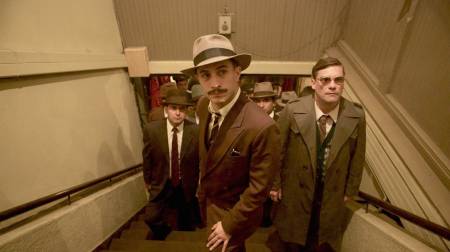
GARCÍA BERNAL IN NERUDA
Larraín's metafictional tale of the famous fugitive poet and his unknown usurper
The Chilean filmmaker Pablo Larraín built a career out of depicting his country's dark time in the Pinochet dictatorship, into which he was born and lived most of his teens. Allende was killed and Pinochet took over in 1973 and reigned till 1990; Larraín was born in 1976. Best are Tony Manero (2008), technically Larraín's second film, and Post Mortem (2010), both starring great Chilean actor and man of the theater Alfredo Castro. Castro made these two pictures, singlehandedly defining Larraín's picture of the slime and gloom of the regime. They're simple, low-keyed films. And they're great.
Something more positive and diffuse came next in the director's 2012 No, featuring Gael García Bernal as an ad man whose publicity campaign was instrumental in PInochet's losing a plebiscite and giving up power. With The Club (2015) Larraín returned to creepiness in a vaguely contemporary depiction of corruption and repression in the Catholic church.
Larraín is busy and productive. No and his latest film, Neruda, are more elaborate productions. But the truth is nothing he has done has the authority and originality of Tony Manero and Post Morten. Granted the energy of its surreal visuals and many tableaux, Neruda, a grand and glossy metafictional phantasmagoria about the famous Chilean communist poet on the run, is on the overblown and repetitious side. The same formulas and the same lines of poetry ring out over and over. Neruda's ambitious but ineffectual young police nemesis Óscar Peluchonneau is played by Garcia Bernal. His perhaps imaginary presence and his tiresomely insistent voice-overs take over the screen from Luis Gnecco as Neruda, a less interesting actor than Alfredo Castro, the poet coming off as a blowhard.
But he is an audacious one, certainly, whose following among vast elements of the general public is made clear. This Neruda is many people, poet and senator, loving husband, "bigamist" (since he has a foreign first wife who's dredged up unsuccessfully by the government) and denizen of brothels. This links him with Peluchonneau, who is or imagines himself to be the illegitimate but ultimately acknowledged son of the founder of the police department, represented by a giant-sized statue, by a woman who worked in a brothel for thirty years. Peluchonneau keeps repeating that he is not a supporting player. (Vadim Repin has suggested that Peluchenneau is in a love-hate relationship with his prey just as Larrín is with Pinochet, whose regime has been so fruitful for his work.) And this is another uncertainty of the film, an intriguing one: who is the protagonist, the pursuer or the pursued, the great poet fleeing over the Andes into lifetime exile, or the nonentity who narrates the film and seeks to become its protagonist? García Bernal is the internationally famous artist, of course, so for non-Chilean audiences his character attracts more attention.
The film has gotten raves in festival showings. Typical of those is the reaction of Justin Chang in a Toronto roundup for Variety, calling it "the most inventive, freewheeling movie about an artist since Todd Haynes' 'I'm Not There.'" Critics like that it's not "an ordinary biopic" but instead (in Chang's words) "a richly inventive fantasia on the poet's themes." What are "the poet's themes," though? The phrase is troublingly vague. Departing from history and seeking a historical figure's "essence" is doubtless welcome; we're all tired of conventional biopics. But for all the cinematic flourishes, it doesn't work here. Maybe Neruda is a grand and epic failure, but it's a failure for sure - one that wears out its welcome early on. For all its fantasies and changes rung on the actual life of its subject, Neruda looks more like a conventional big budget picture than anything Larraín has done up till now.
The fundamental problem is an uncertainty of tone. From the start, a (typically) elaborate scene in which Neruda and the President of Chile trade insults, in a set that seems part seat of government, part urinal, proceedings seem the have more than an edge of satire, but to also be pretty serious. It looks like Neruda is about to get into bad trouble. This becomes more problematic for the gringo viewer whose knowledge of the history is limited. We can understand the Seventies. Dictatorship is an easy thing to grasp. But these are the Forties (signaled more by the cars than anything else), and we don't know what was going on in Chile then. Neruda boasts of being a communist - the thing that's going to lead to orders for his arrest (and the real or imaginary Óscar Peluchonneau's setting out to find him). But at the same time he doesn't seem to take being a communist seriously.
I do like the idea of this relationship between a noble victim and García Bernal's dapper little mustachioed martinet of a cop who keeps almost finding him, and ends falling down in the snows of the Andes. These scenes and many others are gorgeously photographed: snow has rarely looked prettier. The mock-serious, deadly dangerous yet laughable, setup is one that Nabokov used in a number of his novels, and I can best understand what Larraín was trying to do by seeing this as a Nabokovian tragicomedy. I also liked seeing pretty-boy García Bernal play a more mature, and less flattering, role. Peluchonneau's's lonely scenes are in stark contrast to the more cluttered sequences involving Neruda and entourage, as they must since the two men never come directly into contact.
Neruda, 107 mins., debuted at Cannes Directors Fortnight May 2016; at least 14 other international festivals including Telluride, Toronto, New York and Mill Valley. It is to be Chile's entry in the Best Foreign Oscar competition. US theatrical release to begin 16 Dec. 2016. In NYC at the Film Society at Lincoln Center and IFC Center.
Last edited by Chris Knipp; 12-15-2016 at 12:46 PM.
-
STAYING VERTICAL/RESTER VERTICAL (Alain Guiraudie 2016)
ALAIN GUIRAUDIE: STAYING VERTICAL/RESTER VERTICAL (2016)
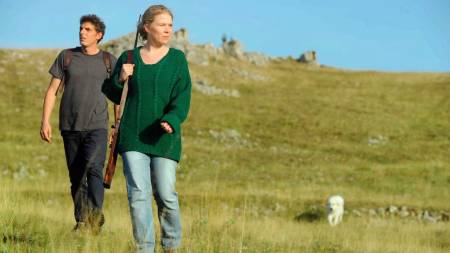
DAMIEN BONNARD AND INDIA HAIR IN STAYING VERTICAL
Country life
Gay-oriented French director Alain Guiraudie, whose Stranger by the Lake/L'inconnu du lac in Un Certain Regard at Cannes in 2013 won him a lot of prizes, made it for the first time into Cannes Competition with this year's Staying Vertical/Rester vertical. Having seen only his last two features (he's made eight) I can hardly generalize, but the New York Film Festival Q&A brought out that Guiraudie often makes a new film that contrasts with the last. Staying Vertical's changes of location and wild unpredictability are indeed in sharp contrast with Stranger by the Lake's tight police procedural structure and strict limitations of time and place. The last film could be seen as a grimly realistic critique of cold gay sex. The new film is notable for its comically free-flowing sexuality. It also has an element of the surreal and of fable, and a mythological beast, the wolf, which may have its parallels in the male cast members.
Vertical's narrative follows its strapping main character Leo (Damien Bonnard), a screenwriter wandering homeless around southern France in his Renault. He keeps asking his producer (Sébastien Novac) to wire him 3,000 euro advances, but he hasn't written a line. He meets a feisty young shepherdess called Marie (India Hair) and they have tender (and realistic) sex and a baby is born (fast forward, obviously, and also realistic). Guiraudie handles the impulsive and natural sex very casually. Marie has post-partum depression and runs off to town with her two young sons, leaving Leo with the baby. Leo also has to contend with Marie's ogreish father Jean-Louis (Raphaël Thiéry), who seems to be dangerous, and also predatory. And from the start he has kept coming back to an old man by the roadside, Marcel (Christian Bouillette), for whom age has never lessened his pleasure in Pink Floyd played at top volume, who slings homophobic abuse upon the pretty young man who lives with him, Yoan (Basile Meilleurat), whom Leo propositions, but who has no use for Leo. Leo goes repeatedly for some kind of plant therapy in a swamp, just as he keeps going back to Marcel and looking for Yoan. He takes care of the baby, but this becomes increasingly shaky as he runs out of money and is attacked by homeless people and left naked. He is fascinated by wolves, who are a real menace in France these days. At one point Jean-Louis uses the baby as a bait for them.
As D'Angelo writes in his Cannes report for AVClub, Guiraudie makes all this outrageous stuff work through rhythmical repetition, and there is a tonic quality about the flow of freedom and responsibility. This film neatly skates the line between what could make you cry and what could make you laugh, though in the Q&A the director said he'd have liked to have achieved that to a greater extent and will strive to in future. One of the jokes is how Guiraudie reuses existing characters for new functions instead of introducing new ones. It's a process film and the process is Leo's gradual decline, but at the end in a stunning final scene it seems Leo has been transformed and elevated into a shepherd and saintly wolf whisperer. But apart from anything that happens the pleasure of the film is its continual sense of unpredictability, hovering between tragic and comic, and its country earthiness, the directness of its passions. Guiraudie grew up in a farming family, according to French Wikepedia, and in the Department of Aveyron where much of this film takes place. One might think of Bruno Dumont for the brutal bluntness of the sex, but this is sweeter. Not for everyone, but a great palate-cleanser for the cinephile who's been watching more conventional festival entries like Neruda and Graduation.
Staying Vertical/Rester vertical, 100 mins, debuted at Cannes May 2016 in Competition. Ten other festivals including London and New York in October. Screened for this review as part of the New York Film Festival. US theatrical release by Strand Releasing coming in LA on 20 Jan. 2017 at Laemmle's Royal Theatre and in NYC 27 Jan. 2017 at Film Society of Lincoln Center and the IFC Center.

Alain Guiraudie @ NYFF (CK photo)
Q&A 12 Oct. 2016.
Last edited by Chris Knipp; 12-20-2016 at 06:49 PM.
-
THINGS TO COME/L'AVENIR (Mia Hansen-Løve 2016)
MIA HANSEN-LØVE: THINGS TO COME/L'AVENIR (2016)
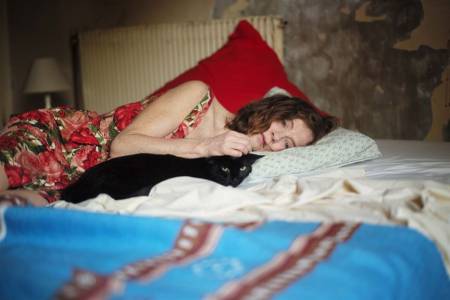
ISABELLE HUPPERT IN THINGS TO COME
Embracing life's hard knocks
In Hansen-Løve's Things to Come/L'Avenir, a film designed with Isabelle Huppert in mind, her character Nathalie, a fiftyish Paris professeur agrégée of philosophy, faces one challenge after another with the kind of aplomb only the seemingly indestructible Huppert can carry off. It's summer, and a lot of the action takes place in northeastern Paris around the sunny Buttes Chaumont. Braving political strikes against government rises in retirement age is the first, and mildest, of her worries. Her husband Heinz (André Marcon), also a prof of "philo," is leaving her for a mistress. Her publisher is dropping her. Her daughter is leaving the nest. Her favorite graduate, a dreamboat, and someone she's probably in love with, Fabien (Roman Kolinka), is moving to a remote leftist commune whose denizens mostly speak German, which she doesn't. Most urgently, her aging mother (iconic actress Édith Scob) is having daily panic attacks and threatening suicide; the firemen are called in every day. Nathalie is saddled with her mother's overweight cat, Pandora, and she's allergic.
This is, in Mia Hansen-Løve's distinctive manner, a realistic "comédie de moeurs" that takes some jumps through time, and hits upon life crises with naturalism, style, and a moral seriousness that yet manages a light touch. Nathalie declares to Fabien that losing her mother, her husband, her daughter, her publisher, she has never been so free, and it's wonderful. One admires her panache. But does one believe her? She collapses in tears more than once.
An awful lot happens in under an hour of this 102 minute film, delivered with such rigorous French elegance, so cooly acted by Huppert, that it's a little hard to take it all in. On the one hand this has been called "the richest" of Hansen-Løve's five features, maybe because the protagonist is going through a classic series of major post-midlife crises. Her other films are more limited in focus, the addict parent of Tout est pardonné , the tragic film benefactor whose suicide leaves his family in the lurch of The Father of My Children, the young couple who part before the girl would like of Goodbye First Love, the music impresario brother with drug issues of Eden. But these also arguably are more particular, less schematic, than the latest film.
Fans of the Coen brothers' Inside Llewyn Davis will note that here too, a protagonist adrift is saddled with a cat. It's her panic at Pandora's temporary disappearance when Nathalie lets her loose at Fabien's country place that shows the disquiet under her façade of outward calm and assurance. One is also reminded as the plot unfolds of the line spoken by Bodhi in Point Break: "Life sure has a sick sense of humor, doesn't it?"
I was not so moved by Things to Come as by the director's previous films (except for Eden, which seemed a little too spread out and panoramic), but a friend whose opinions I respect declared that she "loved, loved, loved" it, and it just may take more time to sink in; this was true for me of Tout est pardonné. An angle to reconsider is how well Nathalie's "philo" instruction works for her, whether there is an ironic disconnect between text and life (as Nathalie's text books are declared defunct), or au contraire her conduct - something Isabelle Huppert, past 60 but still beautiful, elegant, and girlish, can carry off - may truly reflect the heroism life requires of us on a daily basis.
Things to Come/L'Avenir, 104 mins., debuted at the Berlinale, winning the Silver Bear for Best Director and nominated for the Golden Bear for Best Film. French theatrical release 6 Apr. 2016, to very strong reviews (AlloCiné press rating 3.9/27 critics). Shown at nearly two dozen other international festivals including the New York Film Festival, where it was screened for this review 14 Oct. 2016.
US limited theatrical release begins 2 Dec. 2016.
Last edited by Chris Knipp; 11-29-2016 at 09:14 PM.
-
ELLE (Paul Verhoeven 2016)
PAUL VERHOEVEN: ELLE (2016)
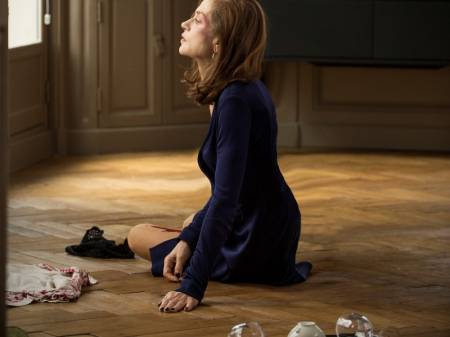
ISABELLE HUPPERT IN ELLE
My rapist
It is a uniquely disorienting and confusing pleasure to watch Isabelle's two latest movies - Mia Hansen-Løve's Things to Come/L'Avenir and Paul Verhoeven's Elle - one after another, as I just did in New York. Both were playing in the city's premier annual cinematic event, the New York Film Festival. Some young journos who slogged through them with me joked that if neither one quite was a great film, a mashup of the two might be a zinger. Actually either one of them is a zinger by itself. Isabelle Huppert is simply an amazing actress, the most prolific and quite possibly the most brilliant in movies today.
In the first, Huppert plays Nathalie, a Paris university "philo" prof, who's more or less an ordinary human being, though exceptional in her aplomb in the face of hard knocks. She is dumped by her academic publisher and her longtime husband; left in the lurch by her handsome favorite student; faced with her mother's dramatic aging and death, her daughter's leaving the nest, becoming a grandmother, and rescuing a cat.
In the second, Verhoeven's Elle, Huppert plays Michèle Leblanc, the owner-manager of a successful video game company with a very, very strange past and an equally weird present. She's not really remotely a normal human. She's an Isabelle Huppert superwoman-monster. This is a mystery, a comedy, and a horror movie. It also confusingly meshes with the previous film. Here too she becomes a grandmother, must contend with a trying aging mother. And in both there is a cat, and the Huppert protagonist weathers a series of literally very hard knocks with, well, this time, super-human aplomb.
Verhoeven hasn't made a movie for a decade and this is his first made in France. It happened because Huppert latched onto the project before Verhoeven did, and Hollywood rejected it, after American David Birke had adapted Philippe Djian's French novel for the screen. The rejection, Verhoeven has explained, was because in Hollywood, if a woman gets raped and pursues the rapist, there's got to be revenge. But there was no revenge in the book, or Birke's screenplay. Instead, the raped lady, a successful businesswoman of unsinkable froideur, gets involved in a tricky game of cat and mouse with the rapist. The "mystery" soon ends, though, as she discovers the rapist (Laurent Lafitte) close at hand - but does nothing to have him apprehended.
Michèle Leblanc gets raped in the first frames, by a tall masked man in black (we'll revisit this scene again, and again). They fight, violent blows are exchanged, a table full of china crashes onto the floor of Michèle's suburban mansion. Violent intercourse occurs, with panting and yelling. The masked man flees. Michèle then gets herself up, and sweeps away the mess. She tells her boyfriend the big bruise on her face is from a fall off her bike. She goes about her business. It's only later she tells friends and family she was assaulted. She does not tell the police. This is because she does not like police, for reasons we learn later.
Elle seems trashy, but Verhoeven's movies always do, even at their best, and this time it's trash with an elegant French gloss. The mixture of violence and blood and murder in a bourgeois French setting reminded me of Chabrol; and, of course, Huppert worked for Chabrol - six times. Even Chabrol would probably not have filmed a story with trappings as lurid as these. Michèle's mother (Judith Magre) is a disgusting old crone, her face a bumpy mélange of crude cosmetic surgeries and with the occasional "petit botox." She has a paid muscular young lover called Ralf (Raphaël Lenglet). Her father is in prison for life for a series of lurid murders when Michèle was a girl - and may have participated.
The video games Michèle's company makes are lurid, sexual, and violent too, and the company is mostly cocky young men, who mock her. There is a version of the latest game mocked up to amuse the team in which Michèle is sodomized by a tentacled digital monster. There are other subplots. Michèle has a lover (Christian Berkel), who is the husband of her best friend (Anne Consigny), and her ex-husband (Charles Berling) is still in the picture. She has a strapping young doofus of a son called Vincent (Jonas Bloquet), who's expecting to have a baby with his girlfriend, Rebecca (Virginie Efira), who's crazy; the baby clearly is not his, and the father is black. Yet Michèle considers herself a grandmother. Her parents do not fare well. The protagonist masturbates watching her rapist, and a Christmas crèche; religion provides more than one form of conciliation. Some of this stuff would get in the way of a Chabrol plot, but it's all grist to Verhoeven's energetic gin mill.
Half the pleasure of Elle is seeing Huppert sail through the turbulent, convoluted action. Michèle Leblanc was a character she had to play. Elle has an excellent cast with plenty of depth, but it is Huppert who makes it work. She is indestructible. We don't really know who Michèle Leblanc is or what makes her tick, but with Huppert, it can happen. This movie is another expansion of the repertoire of the inexhaustible actress, and as noted in a NY Times article, writer "have noted that Elle includes sly references to her formidable filmography, including Michael Haneke’s The Piano Teacher (2002); Christophe Honoré’s My Mother (2004), a story of incest; and Claude Chabrol’s Madame Bovary (1991)."
No doubt Huppert has been through many vicissitudes on film, but Elle reminded me of Catherine Breillat's bravely honest autobiographical film, Abuse of Weakness, in which Huppert also stared, and was brilliant and convincing. It depicts how Breillat had a stroke, and the disreputable man who became her "helper" took over her life, and her bank account, wiping her out financially. Here too, the Huppert character is Teflon-coated, knocked down, but unbowed. That was real life. Elle is ghastly fun.
Elle, 130 mins., debuted at Cannes in Competition May 2016 and was nominated for the Palme d'Or; 20 other festivals, including New York, where it was screened for this review 14 Oct. 2016. Released theatrically in France 25 May 2016, it received raves (AlloCiné 4.4/37 reviews). US theatrical release 11 Nov. (English-language reviews ecstatic: Metacritic score 90; UK release coming 24 Feb. 2017.
Last edited by Chris Knipp; 11-13-2016 at 01:41 PM.
-
CERTAIN WOMEN (Kelly Reichardt 2016)
KELLY REICHARDT: CERTAIN WOMEN (2016)
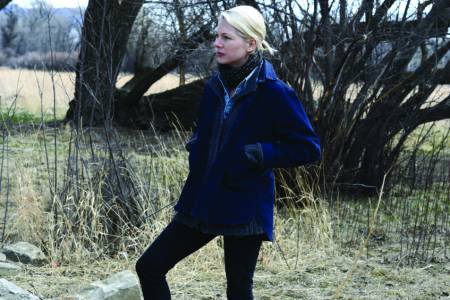
MICHELLE WILLIAMS IN CERTAIN WOMEN
Lost women in Montana
This time Kelly Reichardt, the respected Amerindie director and chronicler of women (and sometimes men) in states of aimlessness, has combined stories by Maile Meloy about three women living in the same rural town in Montana and a fourth further flung, filmed with an eye for the poetry of the ordinary in handsome earth tones. The first two segments are connected by James Le Gros, who's the lover of small town lawyer Laura Wells (Laura Dern) and husband of Gina Lewis (Michelle Williams). Three tales unfold, but though the first has crime drama elements and even a kidnapping and police stakeout (low keyed, of course), only the third, about a lost young lawyer, Beth Travis (Kristen Stewart), who attracts the hopeless affections of Jamie, a lonesome cowgirl (first-timer Lily Gladstone), is emotionally touching. Maybe Jared Harris, as Laura Dern's client and an injured carpenter who's lost a workman's compensation case, gets the prize for most pathetic, ranging from tears to threatening mass murder, winding up in prison abandoned by his wife for a convict in another state. But it is hard to care about him, or about Laura Dern's guilt at failing to save him. But as Jamie, Lily Gladstone is remarkably real.
In the middle segment, where James LeGros immediately reappears as the husband of Gina Lewis (Michelle Williams), she is preoccupied with building a house out in the country, and we follow a singularly unfulfilling trip withRyan ( Le Gros) and their boyish, hostile daughter Guthrie (Sara Rodier) to persuade an old man to sell them his pile of sandstone blocks. The old man agrees - maybe; but Le Gros uses passive-agrressive comments to make sure the commitment isn't clear. Seeking to interpret the film, A.O. Scott wrote in the NY Times, "Those rocks are at once symbols of transience and of permanence." Okay. So what? Similarly Laura (Dern) spends time with the exploding (or imploding) Fuller (Jared Harris), but without really helping him. The episode when Fuller kidnaps a Samoan guard and Laura is sent up to reason with him wearing a bullet proof vest is the most excruciating of the lot. We submit to lengthy delays, Fuller forcing Laura to read passages from his case that confirm he was screwed, only to have Fuller taken away to jail. Her visit to him in prison later provides a dreary, inconclusive fullow-up.
On the other hand the third segment has the quality of an actual narrative. Beth Travis (Stewart) is a young lawyer who's taken a side job teaching the night course in "school law," about which she admits she knows nothing. The students are all local teachers whose real interest is just complaining about injustices or limitations in their jobs. A tentative, distant, but fraught relationship develops between Beth and Jamie (Lily Gladstone), who has just wandered in, and keeps coming for a few classes (while they last) to accompany Beth to the local diner and chat. Jamie learns something of Beth's background but Beth's main concern is she miscalculated how bad the drive was, four hours each way. When it's announced Beth isn't coming any more, Jamie makes the long drive to her town and stalks her, waits up all night. She can't declare her love and it wouldn't help if she could, but the long held shot of Jamie's face as she drives away empty handed is heartwrenching. The rest of the film, touching back on the two other stories, is anticlimactic. And we note that while Jamie remains in her Brokeback Mountain world of pretty horses and lonely pining, the third, more resonant, tale has become hers and not Beth's.
If Reichardt achieves authenticity and a sense of real time in these sad, dreary tales, there's also a lack of economy and a lack of verve, almost a stubborn clumsiness. And so this time it's tempting to side somewhat with Rex Reed in the Observer, who commends the acting in this film but condemns Reichardt's style. "Nothing ever happens in her movies," Reed says, "but a handful of critics rave, they end up on the overstuffed programs at film festivals like Sundance and are never seen or heard from again." That isn't really true. But this is a failed movie with one powerful thread, and I wish Reichardt's 2013 Night Moves had gotten all the attention that her 2010 Meek's Cutoff did.
Certain Women, 107 mins, debuted at Sundance Jan. 2016, and was shown at 17 other international festivals, including London, Mill Valley, and New York. Screened for the review at IFC Center 16 Oct. 2016.
Last edited by Chris Knipp; 10-17-2016 at 01:43 PM.
-
THE UNKNOWN GIRL/LA FILLE INCONNUE (luc, Jean-Pierre Dardenne 2016)
LUC, JEAN-PIERRE DARDENNE: THE UNKNOWN GIRL/LA FILLE INCONNUE (2016)
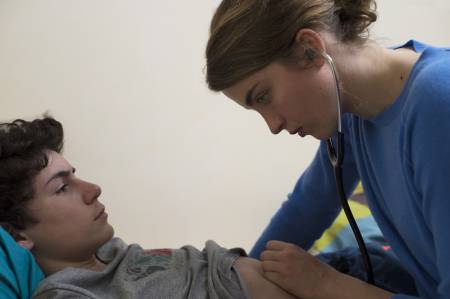
LOUKA MINNELLA AND ADÈLE HEENEL IN THE UNKNOWN GIRL
Another dogged pursuit, harder to care about
The Belgian directors Luc and Jean-Pierre Dardenne are masters of about moral awakenings and obsessive pursuits of a task. Here is another one of those, if more of the latter than of the former.
In La promesse, which put them on the map, it was a teenage son (the start for the great Jérémie Renier) in defiance of his mean father (the equally great Olivier Gourmet) keeping a pledge to do right by an abused immigrant. In Rosetta, a teenage girl (Émilie Dequenne) is in desperate, tireless pursuit of a decent job to escape her alcoholic mother. In The Son/L'Enfant, a carpentry teacher (Gourmet again) pursues the boy who killed his son, with ambivalent motive but a final moving shift toward forgiveness. In The Child (Renier again) a young man seeks to sell his own baby, but comes to see the wrong of this desperate and ignorant act. Lorna's Silence is far more complicated, but involves the protagonist's desperate struggle to open her own business The Kid with the Bike, starring another young discovery, young firecracker Thomas Doret, with the luminous Cécile de France, follows a boy's desperate (and useless) effort to reunite with his father (Renier, grown up now), who has abandoned him.
The Dardennes used a big star, Marion Cotillard, for Two Days, One Night, typically about a desperate pursuit during the allotted time in the title to persuade a group of coworkers to vote against a bonus so she can be allowed back to work after a nervous breakdown. It's a dogged, exhausting story, but an actress as good and as appealing as Cotillard and a suspenseful plot, it holds our attention till the last.
The Unknown Girl/La fille inconnue is typical Dardennes material. But both because of the theme and the lead actress, despite attentive craftsmanship to every scene, the whole film feels less involving or moving. It's about young Liège general practitioner Jenny Davin Adèle Haenel), who attempts to uncover the identity of a would-be patient who has died after she has ignored her desperate effort to be admitted after hours. This is a task not involving moral development so much as perhaps an act of penance, and relief of a guilty conscience. Adèle Haenel has shone in dry, feisty roles, and that aspect is tamped down here, but she lives up to expectations: convincing as the businesslike young doctor, she is relatable, if not adorable, and Jenny achieves her goal. She has the necessary convincing dedication and tireless intensity. But as written, the character does not significantly change.
The story is neatly told; one scene rapidly follows another. And yet, since Jenny is juggling doctoring with crime investigating, the narrative proceeds unevenly. Sometimes it's hard to see if she is doing her job as a doctor, or pretending to as an excuse to contact various people and press them for details of the unidentified woman, showing her photo on her smart phone. The latter was African, a prostitute, connected with drug dealers, and so Jenny winds up sticking her nose into places where she isn't welcome. The film starts to seem like a police procedural conducted ay an amateur - without the suspense such tales normally involve. The cops even approach Jenny at one point to tell her she's marring their process by spooking potential sources. And then there is the case of Julien (newcomer Olivier Bonnaud), an intern working with Jenny whom she pursues with equal doggedness after a child having an epileptic fit apparently shocks him so much he decides to give up training in medicine. She even goes to see him out home in the country to have a heart-to-heart talk. It apparently succeeds, she learns from a phone call. However involving, this story seems tacked on. As has happened sometimes before, this is an unmistakable Dardennes film, but not one that shakes you to the core as the best ones do.
The Unknown Girl/La fille inconnue, 113 mins., debuted at Cannes in competition May 2016; 13 other festivals; French theatrical release 12 Oct. 2016, also included in the main slate of the New York Film Festival; US premiere that day. French critical response mild (AlloCiné press rating 3.2/30).
Last edited by Chris Knipp; 11-22-2016 at 09:20 PM.
-
TONI ERDMANN (Maren Ade 2016)
MAREN ADE: TONI ERDMANN (2016)
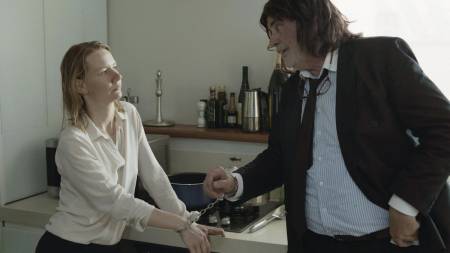
SANDRA MÜLLER AND PETER SIMONISCHEK IN TONI ERDMANN
Maren Ade's festive comedy
In Maren Ade's Toni Erdmann, which is more special and original than it may seem, a goofy, slightly over-the-hill father teaches his ultra-serious corporate daughter some lessons about life. In two words, he teaches her to lighten up. The film is rambling, and may seem overlong. It may indeed contain some unnecessary longeurs. But it needs to be this way. It's teaching viewers about the kind of patience and alertness in life's most boring times, leading to transcendence, that David Foster Wallace talks about in his famous 2005 Kenyon College commencement address titled "This is Water." And the film builds and builds, slowly. There needs to be a moment when you think it's just tedious and pointless. Because Ade avoids making her "points" (except that it's a simplification to denote them so) in any obvious way.
Reports of this film came from Cannes, where it was the European critics' favorite and thought a contender for the top Competition prize, but it didn't get that. It's not a movie everyone will like. Mike D'Angelo, whose Cannes reports I've been following since his arresting "Open Letter to Lars von Trier" from the festival in 2009, loved Tony Erdmann and reported it had gotten unusual spontaneous applause (as had Holy Motors and a few others in his Cannes years) because it has a number of "glorious moments" that are "designed to blindside you," and are "in keeping with the first character we meet, Winfried Conradi (Peter Simonischek)." Simonischek is a big, shambling man with a shaggy-dog mop of grey hair, which is important)." He's the father, a devotee of practical jokes (think Lord of Misrule). When his beloved dog Willy dies, he takes a long vacation from his job as a schoolteacher. We've seen him there leading a celebratory song where he and all the students are wearing fright mask makeup, with ugly fake teeth.
Winfried doesn't take off the makeup for a while. He decides to pay a surprise visit to his daughter Ines (Sandra Hüller, wiry, tough, and fearless), in Bucharest, where she's currently working. At first he really annoys Ines. His jokes are invasive and out of place, though there's something touching and sweet about him, and them. Gradually his behavior gets through to Ines, in a good way. Ines has a key position - she lives in a large, glamorous apartment and is her boss's most important staff member, but she must also always struggle against male chauvinism in the business world, working twice as hard. A key aspect of Ade's film is that she, like Winfried, is viewed with kindness and understanding. She is heroic and tireless, going from dealings with staff to a big presentation, juggling shifts from English to German, supply always seeming to agree with criticisms to maintain the upper hand.
Ines' heroism shows particularly in how she handles her father, especially when she tells him he must go (not just a woman executive's reaction: anyone would be upset by a father like this) and he says goodbye - then reappears in a fright wing with the fake teeth calling himself "Toni Erdmann," and saying he's a "life coach." Indeed Ines has one, whom she consults with via Skype, but Toni Erdmann's sense of the title is broader than how to win at business; it's really how to live. So anyway Ines remains patient with him. His imposture is too outrageous to expose to associates and colleagues; it would be too embarrassing; but she also shows remarkable forbearance and discipline in managing to fit him in. And as she does this, gradually his touching excesses of humor (and they are excesses: he has little control over them) show her how much she's been destroyed by an excess of the seriousness and self-discipline she's marshaled to perform her demanding job; that it's not worth it. That she's become cold and unkind, soulless.
None of this is spelled out, though. It's embodied in a long succession of bizarre incidents interwoven with the fractured details of Ines' high-pressure, accomplished, unfun life, incidents in which her father shows her how good will and human kindness, the willingness to do good spontaneously, to act outside a plan, are missing from her life.
Partly the film is the story of the story of two dysfunctional personalities who bring out each other's rehabilitation by expressing the love they feel for each other. In fact, for a while as sometimes Ines out-crazies her father, D'Angelo notes father and daughter's "relationship grows ever more dysfunctional, even as it seems likely that 'Toni' is the only thing keeping Ines from throwing herself out the window of her high-rise apartment." We get a full view of Ines' life as it now is, but also a full view of its life-affirming disruption. The lesson the meandering, enlightening action teaches is like the rediscovery of the natural and the wild spirits in man embodied in ancient ritual and revived in what C.L. Barber desceribed as "Shakespeare's Festive Comedy." It's not a "magical cure" for all Winfried's "daughter's unhappiness," as D''Angelo notes. But it's a statement, through very particular events, off a general set of valences in the world, and how the spirit of play and ability to laugh are essential to us. It recognizes that the clowns are not the real lunatics.
The strength of Toni Erdmann lies in how it uses humble material, crude humor, and an almost real-time progression of incidents, to deliver something that could be corny in a subtle, natural way. This is even like an Adam Sandler movie, specifically his That's My Boy, D'Angelo notes "a few wags" saying. And yet it's nothing like. It's perhaps like a bizarre home video. The combination didn't win the big prizes at Cannes, but did win the FIPRESCI Prize there, and other awards elsewhere.
Tony Erdmann, in German and English, 162 mins., debuted at Cannes in Competition (FIPRESCI Prize); over two dozen other international festivals including Telluride, Toronto, New York, London, and Mill Valley. Screened 20 Oct. 2016 at the Saint-André-des-Arts II cinema 12 rue Git le Coeur, Paris. It opened 17 Aug. in France; still showing at 8 cinemas in Paris. French critical response ecstatic (AlloCiné press rating 4.3 based on 32 reviews); the Anglophone critics' response this time is similar: Metacritic score 94%.
Last edited by Chris Knipp; 05-16-2021 at 11:35 PM.
 Posting Permissions
Posting Permissions
- You may not post new threads
- You may not post replies
- You may not post attachments
- You may not edit your posts
-
Forum Rules





 Reply With Quote
Reply With Quote







Bookmarks